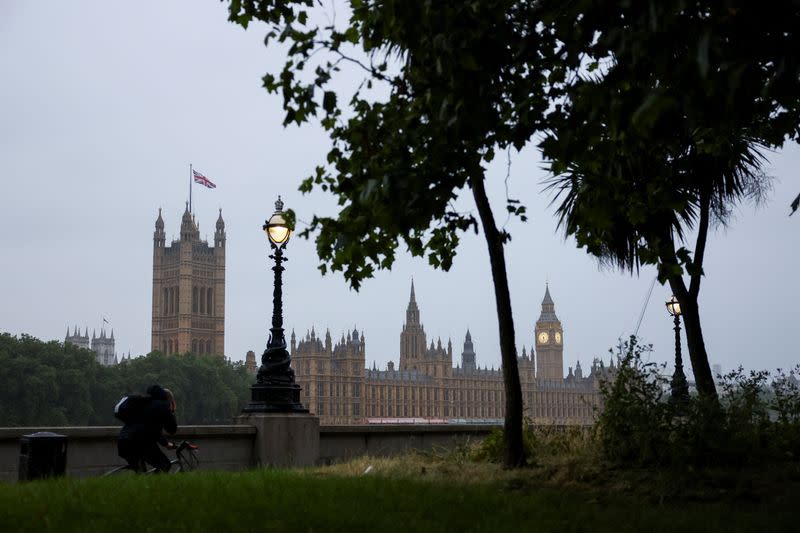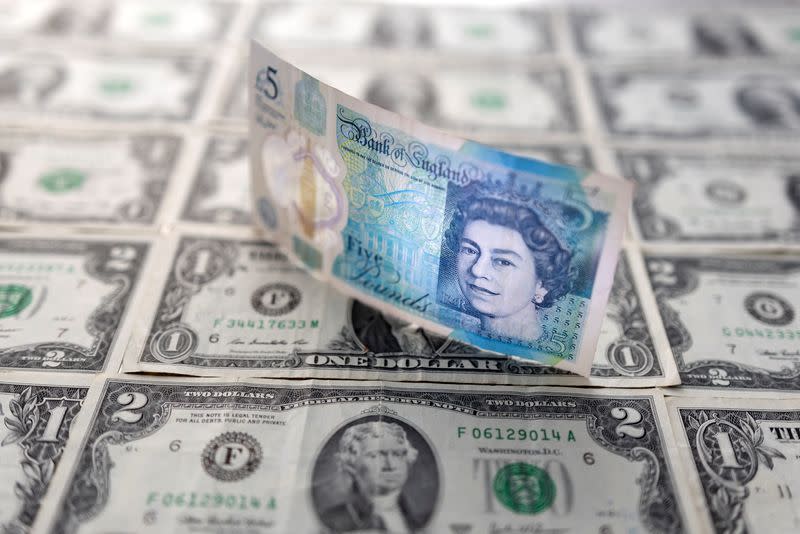British assets gain, mid-cap stocks lead after Labour party election win
By Amanda Cooper and Alun John
LONDON (Reuters) -British domestic-focussed mid-cap stocks were the biggest gainers on Friday after the centre-left Labour Party surged to a comprehensive win in a parliamentary election with blue chip stocks, government bond prices and the pound higher.
Hopes that the incoming government will provide a period of economic stability after an often tumultuous 14 years of Conservative Party rule sent the FTSE 250 midcap index up as much as 1.8% in early trading to its highest since April 2022.
The blue chip FTSE 100 index was last up 0.2% and the yield on 10-year British government bonds or gilts, dropped 3 basis points to 4.17%, marginally better than other European markets.
Bond yields move inversely to prices.
Labour won a massive majority in the 650-seat parliament while Rishi Sunak's Conservatives suffered the worst defeat in the party's long history as voters punished them for a cost of living crisis, failing public services, and a series of scandals.
"A landslide victory provides the sort of clarity and stability that equity markets need in an increasingly volatile world," said Ben Ritchie, head of developed market equities at abrdn.
"If the new government gets this right, businesses with significant exposure to the UK economy should be the likely winners - a shot in the arm in particular for companies in the FTSE 250 and FTSE Small Cap".
British home builders stood out, with an index tracking their shares up 2.3%.
"We think the formation of a Labour-majority government will have a positive impact on housebuilders and construction materials," said Aruna Karunathilake, portfolio manager at Fidelity.
"We expect Labour to reinstate housebuilding targets and perhaps also fund investment in local planning departments... That should alleviate builders’ concerns about planning bottlenecks impeding growth in the medium term."
Analysts at Goldman Sachs said that while Labour's manifesto policies imply relatively limited changes to fiscal policy they would modestly boost demand in the near term.
As a result, they raised their forecasts for British GDP growth by 0.1 percentage points in each of 2025 and 2026.
GILTS IN FOCUS
British government bonds, or gilts, will be in focus as the memory of the market chaos triggered by former prime minister Liz Truss' "mini budget" of September 2022 is still relatively fresh in investors' minds.
Truss lost her parliamentary seat in Thursday's election.
Britain's stretched finances will give any new government little leeway to increase spending, and so preserving investor trust while tackling numerous economic challenges will be paramount, though stability will help.
"I do think this (election result) is in itself a positive for the gilt market," said James Lynch, fixed income manager at Aegon Asset Management.
"I think you're taking away one of the sources of volatility which we have had for the gilt market over the last few years, which is political instability. And that now really has gone away for the next few years," he said.
Relative economic stability in recent years has already been having an effect.
The premium that investors demand for the extra risk of holding gilts rather than top-rated German 10-year bonds has remained stable this year at around 160 basis points - far below the 230 basis points seen during a mini-budget crisis in 2022.
That premium was down 2 basis points at 159 basis points on Friday.
The focus for bond investors will turn to the Bank of England, which is widely expected to lower interest rates either in August or September.
Sterling was up nearly 0.13% against the dollar at $1.2775 and steady against the euro, which was at around 84.72 pence.
The British currency has been edging up since Sunak called the election in late May, earlier than anticipated. It is the strongest-performing major currency this year, up 0.3% against the dollar.
On a trade-weighted basis, the pound is now back where it was in 2016, at the time of the Brexit vote, reflecting a belief among traders and investors that a period of intense market volatility, driven by political and economic tumult under the Conservatives, may be drawing to a close.
(Reporting by Amanda Cooper and Alun John in London; Additional reporting by Dhara Ranasinghe and Naomi Rovnick and Harry Roberston; Editing by Matthew Lewis, Christopher Cushing, Jamie Freed, Andrew Heavens, Yoruk Bahceli, Gareth Jones and Tomasz Janowski)

 Yahoo Finance
Yahoo Finance 

